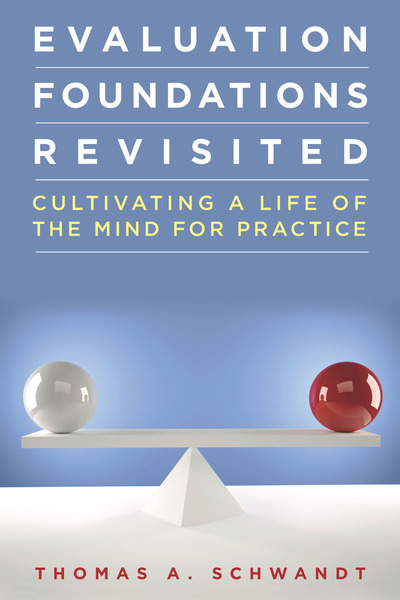
2015
216 pages.
$65.00
Paperback ISBN: 9780804786553
Ebook ISBN: 9780804795722
Evaluation examines policies and programs across every arena of human endeavor, from efforts to stop the spread of HIV/AIDS to programs that drive national science policy. Relying on a vast array of methods, from qualitative interviewing to econometrics, it is a "transdiscipline," as opposed to a formal area of academic study. Accounting for these challenges, Evaluation Foundations Revisited offers an introduction for those seeking to better understand evaluation as a professional field. While the acquisition of methods and methodologies to meet the needs of certain projects is important, the foundation of evaluative practice rests on understanding complex issues to balance. Evaluation Foundations Revisited is an invitation to examine the intellectual, practical, and philosophical nexus that lies at the heart of evaluation.
Thomas A. Schwandt shows how to critically engage with the assumptions that underlie how evaluators define and position their work, as well as how they argue for the usefulness of evaluation in society. He looks at issues such as the role of theory, how notions of value and valuing are understood, how evidence is used, how evaluation is related to politics, and what comprises scientific integrity. By coming to better understand the foundations of evaluation, readers will develop what Schwandt terms "a life of the mind of practice," which enables evaluators to draw on a more holistic view to develop reasoned arguments and well fitted techniques.
About the author
Thomas A. Schwandt is Professor of Education at the University of Illinois at Urbana-Champaign. A Fellow of the American Educational Research Association, in 2002, he received the Paul F. Lazarsfeld Award from the American Evaluation Association for his contributions to evaluation theory. He is the author of Evaluation Practice Reconsidered and the Dictionary of Qualitative Inquiry. Schwandt is Editor Emeritus of the American Journal of Evaluation.
"An in-depth overview of the evaluation profession, framed around its central concepts, values, and issues, and rendered in beautifully clear prose. Schwandt's impassioned argument is that evaluation should move beyond technical competence towards professional, ethical, and moral commitment. This book is an excellent guide to understanding the field and the direction it should take."
—Ernest R. House, University of Colorado, Boulder
"Thomas Schwandt's new book is important and timely. Driven by widely-shared concerns that ongoing technical trends could result in an increasingly arid, tool-obsessed evaluative enterprise, the book presents (1) an eloquent, beautifully researched framework for cementing the fundamental relationship between theory and practice, and (2) a reminder of the central role that evaluation—so conceived and so integrated—plays in the progress of a democratic society."
—Eleanor Chelimsky, U.S. Assistant Comptroller General for Evaluation and Methodology (Ret.)
"Evaluation Foundations Revisited exemplifies and instructs. This exceptional book puts into practice the critical and analytic skills essential for evaluators in every paragraph. Schwandt presents the complex often subtle reasoning involved in evaluation's notable variability with great understanding. His thinking is never simplistic, and he explores the most complex ideas in elegant writing of the highest order. This book is a must-read for everyone who want to see how the best evaluative thinking works in practice."
—Lois-ellin Datta, President, Datta Analysis
"This wonderful book elegantly demonstrates the centrality of judgment and argumentation which is fundamental to all aspects of evaluation. Schwandt summarizes what we know, and then adds his original explanation of why there is and should be pluralism in evaluation. Both accessible and profound, this book is highly recommended for both students of evaluation and experienced practitioners."
—Peter Dahler-Larsen, University of Copenhagen